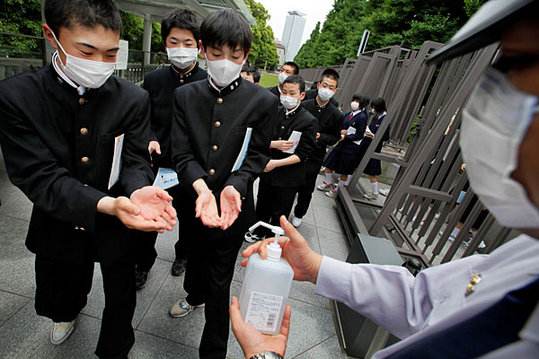Source: Thailand Medical News Jan 16, 2020 5 years, 3 months, 1 week, 3 days, 15 hours, 51 minutes ago
Health authorities in
Japan disclosed on Thursday morning that a male patient treated for
pneumonia after returning from
China has tested positive for the new
coronavirus identified as a possible cause of an outbreak in the Chinese city of Wuhan.
 Studenst in Japan taking precautions in wake of the new viral pneumonia outbreak in China
Studenst in Japan taking precautions in wake of the new viral pneumonia outbreak in China
The male patient developed a fever and cough on Jan. 3 while in
Wuhan, returned to
Japan on Jan. 6, and was hospitalized four days later as the symptoms persisted, with his X-ray image showing signs of
pneumonia, the Ministry of Health, Labor and Welfare said.
Diagnostic tests conducted Tuesday found the same
coronavirus as had been detected in other patients in the
Wuhan outbreak, the ministry said.
The male patient has since been released from hospital as his condition improved. He was only identified as a man in his 30s in the Kanagawa prefecture, west of Tokyo, and Kyodo News agency says he is Chinese. His family and medical staff who treated him have not been sickened.
Health officials in
Wuhan said last weekend 59 people had
pneumonia caused by the new
coronavirus and a 61-year-old man had died,
China's first known death from the
virus. The World Health Organization also has said it was consulting with Thai and Chinese health authorities after a case was reported in
Thailand of a Chinese traveler.
Dr Eiji Hinoshita, an official at the ministry's infectious disease section, told
Thailand Medical News that the man told officials he did not go to the fish market in
Wuhan linked to the
pneumonia outbreak, but had "close contact" with at least one person with
pneumonia symptoms at a place where he stayed during the visit. Ministry officials are checking further the patient's activity and people he had contact in
China and in Japan since his return, Dr Hinoshita said.
The news about the infections and new
virus emerged just ahead of the lunar new year when many Chinese tourists are expected to travel. The ministry is urging those visiting or returning from
Wuhan to wear masks and promptly go to medical institutions if they have cough and fever. But officials said the
virus is not considered highly contagious and just passing by or talking to patients would not be a concern.
So far,
China has sought to play down speculation that it could be a reappearance of the
SARS epidemic, which killed hundreds in 2002 and 2003.
Typically,
coronaviruses are a large
family of
viruses, some of which cause the common cold. Others found in bats, camels and other animals have evolved to cause more severe illnesses. Common symptoms include a runny nose, headache, cough and fever. Shortness of breath, chills and body aches are associated with more dangerous kinds of
coronaviruses, according to the U.S. Centers for Disease Control and Prevention.
To date, the
virus has been seen in patients returning from
China to countries like Hong Kong, Taiwan, Korea, Singapore and Thailand.
Many health and epidemiology experts are warning that the real impact of the new
virus will be witnessed about a fortnight to a month after the Chinese New Year Holidays.
